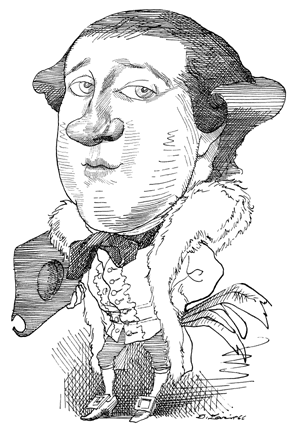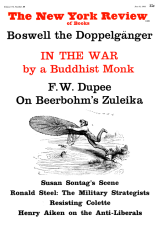Of course Boswell is worth a biography. We know so much about him that the sheer welter of material demands to be pressed and shaped into a whole; it is like having a ton of clay lying idle in one’s back yard. Add the sheer number of famous men whom he knew, and you have a respectable reason for studying him; add his furious sexuality, and he automatically becomes a pet of the mid-twentieth century. And then his open, eager, defenseless temperament, always ready to blab out the truth however discreditable, makes him at once a favorite with the public that enjoys reading Herzog or Henry Miller’s Tropics.
Even allowing all this, it is still the primary task of a biographer of Boswell to convince us that Boswell’s interest is more than ancillary, that he would still claim our attention if he had never met Johnson. Professor Pottle has been improving his knowledge of Boswell for over forty years; in 1929 he brought out a book, much consulted ever since, which assembled the bibliographical materials for a life of Boswell under the title The Literary Career of James Boswell, Esq. Though he tells us, in the Introduction to the present volume, that in 1929 he had no “very active intention” of writing a Life, it might reasonably have been predicted that, if spared, he would ultimately try his hand. It is not in human nature to make a systematic survey of the materials for a biography and then leave to other people the pleasure of actually writing it. As a rule, this length of research, this consistency of devotion, are bad omens. They lead to an absorption in the minutiae of the subject, an unargued assumption that everything about the central figure is of interest, leading straight to the over-documented, suffocating, academic biographical edifice, stuffed with trivialities offering themselves proudly as evidence of devoted investigation. So the first thing to be said about Professor Pottle’s book is that it is free of any such taint. Through all the years he has worked on Boswell, he has kept his sense of perspective.
THE SECOND THING that needs to be said is that the present study takes us only up to Boswell’s twenty-ninth year, and (unless there is something I have missed, lying about in very small print) contains no hint that there will be a second volume. Surely Professor Pottle does not intend to give up now? We must try to encourage him. He must not turn us aside with Johnson’s answer: “No, Sir, no man is obliged to do all that he can do. A man is to have part of his life to himself.” If he stops here, then every subsequent biographer of Boswell will be guided and escorted by Pottle till 1769 and then suddenly flung into a lonely freedom that will probably unsettle his reason.
Underneath all the scurry of Boswell’s life—the journeys, the legal work, the relentless pursuit of women and of the famous—two involvements stand out as crucial. Both were of his own seeking, and both left indelible traces on his mind. One was with Rousseau; the other was with Johnson. Between them, these two men satisfied both sides of Boswell’s nature. Rousseau attracted him by affinity, Johnson by contrast.
The greatness of Boswell’s Life of Johnson does not lie in the vividness of its reported conversation, nor in the copiousness of its research. Other biographies have these things, and are not great. Eckermann’s Conversations With Goethe has a subject as big as Johnson and records his mots with great fidelity, yet it is nowhere near Boswell. The reason is that Boswell’s book has the excitement, the continuous play of life, of a first-rate novel. It is constructed around a tension of opposites. Boswell brings himself into the story as the anti-Johnsonian hero, the man with none of the Johnsonian qualities. He appears to have done this partly by instinct, and would perhaps have been puzzled if any contemporary reader of the book had pointed it out. But it was the infallible instinct of the artist. Macaulay’s caricature of Boswell as the fool who blundered into writing a great book is only a vulgarized picture of the mental processes of any artist.
O what am I that I should not seem
For the song’s sake a fool?
Johnson is the last intact specimen of pre-Romantic European man. His attitudes were substantially the same as those of the Renaissance humanists (minus their skeptical, questioning approach to religious topics), or for that matter those of a classical humanist like Seneca. He believed that there was a broad high road of human wisdom and virtue, down which it was every man’s duty to march, keeping as far as possible to the middle. His most characteristic pronouncements are all in favor of centrality. In literature, he declared, “Nothing can please many, and please long, but just representations of general nature.” Hence the famous remark that the poet “does not number the streaks on the tulip.” Or his often-quoted gaffe, made in conversation, “Nothing odd will do long. Tristram Shandy did not last.” And if this conviction sometimes led him into untenable positions, it also fueled his greatest criticism. The Preface to Shakespeare, once we have trimmed away a sentence here and there which is too locally of the eighteenth century, is the best single essay ever written on that poet; and its main theme is that
Advertisement
His characters are not modified by the customs of particular places, unpracticed by the rest of the world; by the peculiarities of studies or professions, which can operate but upon small numbers; or by the accidents of transient fashions or temporary opinions: they are the genuine progeny of common humanity, such as the world will always supply, and observation will always find.
THIS ATTITUDE, which had dominated Western thinking since (at any rate) Aristotle, was about to lose its ascendancy. Indeed, it did so during Johnson’s own lifetime. Younger men, such as Boswell himself, were shaken by the seismic arrival of new ways of thinking and feeling. The interplay of Boswell and Johnson is thus akin to a theme that was to be much explored by the novel, a form which arose in their lifetime: the upward thrust of the younger generation displacing the older. There are times when Boswell seems cast in the role of Lupin Pooter. At others he is Julien Sorel. His devotion to Johnson is not feigned, though like all disciples he occasionally gives way to the overwhelming impulse to stab his master in the back, but it is homage offered from the other side of a gulf. Boswell does not really believe in the broad high road of humanity. He relishes peculiarity and idiosyncrasy. He cultivates the “interesting” features of his character with the diligence of a boarding-school girl. Fundamentally, his allegiance is with Rousseau. He is attracted to the unique, to the bizarre, to everything that is called “romantic”; he enjoys analyzing the quirks of his own psychology. If he had lived fifty years later, he would have attached himself to Blake, the Samuel Johnson of Romanticism; and his true motto was Blake’s “To generalize is to be an idiot.”
The best advice ever given to Boswell was contained in a letter which Johnson wrote to him on April 8, 1780. The key passage runs:
You are always complaining of melancholy, and I conclude from those complaints that you are fond of it. No man talks of that which he is desirous to conceal, and every man desires to conceal that of which he’s ashamed. Do not pretend to deny it; manifestum habemus furem; make it an invariable and obligatory law to yourself, never to mention your own mental diseases; if you are never to speak of them, you will think on them but little, and if you think little of them, they will molest you rarely. When you talk of them, it is plain that you want either praise or pity; for praise there is no room, and pity will do you no good; therefore, from this hour speak no more, think no more, about them.
Excellent advice! But Boswell could not possibly have taken it. He could no more “think but little” about his psychological quirks, the strange recesses of his mind, than Wordsworth or Gerard de Nerval. “Is it possible,” he asked Rousseau, “to live amongst other men and retain one’s singularity?” Rousseau: “Yes, I have done it.” Boswell: “But to remain on good terms with them?” Rousseau: “Oh, if you want to be a wolf, you must howl.” And, in his own way, Boswell howled.
THE CONTACT WITH ROUSSEAU is fully documented, and most acutely commented on, by Professor Pottle. In all this fascinating book, there are no more fascinating pages. But it was not Rousseau, nor even Johnson, who jerked Boswell back on his heels hard enough to stimulate him into his most basic self-examination. That was reserved for the extraordinary wrangle with Voltaire at Ferney, when the two of them sat in the drawing room with the Bible open between them. Voltaire threw everything at Boswell, including a (real or assumed) fainting fit, but he remained firm and disputed like a true Lowland Scot. Afterwards he wrote, wonderingly, “What a singular being do I find myself.” What, he asked himself, was the reason for his kind reception by “men of the most distinguished genius?” Thinking hard, he discarded any illusions about his learning, judgment, or cheerfulness. But “I have a noble soul, which will shine forth” and “a pliant ease of manners which must please.” Then follows the remark which shows, once and for all, that Boswell knew exactly what he was doing and where his usefulness lay. “I can tune myself so to the tone of any bearable man I am with that he is as much at freedom as with another self, and, till I am gone, cannot imagine me a stranger.”
Advertisement
This was Boswell’s role in life: Doppelgänger to men of genius. To it, he brought the temperament of a poet; not an eighteenth-century poet, reflective and moralizing, nor a modern poet, struggling to impose unity on chaos; but a romantic poet, indeed the archetypal Poet of the romantic imagination—an Aeolian lyre, emptied of personality, a pure perceiver whose work would only have been marred by a coherent individuality. A man of immense energy and zestfulness, he fell prey to mental disorders whenever he found himself alone, without the saving presence of some stronger and better knitted character. Both Boswell and Johnson were often close to madness; but Boswell could cure himself by the exercise of his natural role as “another self” to some larger host; whereas Johnson’s madness could only be wrestled down in solitude and agony. And this is another of the tensions that make the Life as compelling as a great novel.
Boswell was a major writer. If the roots of his achievement were partly neurotic, that is true of any writer. Professor Pottle, in his Introduction, announces that his “prime responsibility” is to “define and assess [Boswell’s] literary genius.” And the special merit of his fine book is that, amid all the profusion of detail, it keeps that object steadily in view.
This Issue
June 9, 1966




